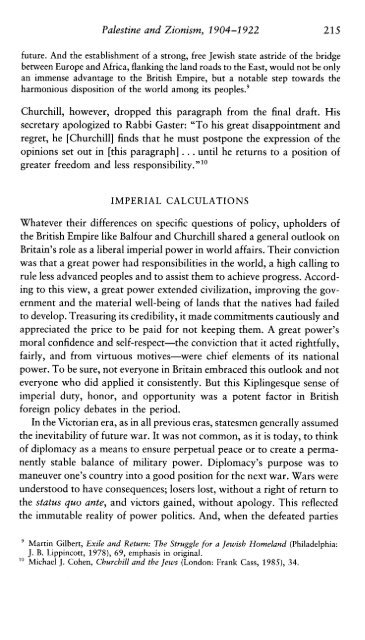Churchill, Palestine and Zionism, 1904-1922 - Douglas J. Feith
Churchill, Palestine and Zionism, 1904-1922 - Douglas J. Feith
Churchill, Palestine and Zionism, 1904-1922 - Douglas J. Feith
You also want an ePaper? Increase the reach of your titles
YUMPU automatically turns print PDFs into web optimized ePapers that Google loves.
<strong>Palestine</strong> <strong>and</strong> <strong>Zionism</strong>, <strong>1904</strong>-<strong>1922</strong> 215<br />
future. And the establishment of a strong, free Jewish state astride of the bridge<br />
between Europe <strong>and</strong> Africa, flanking the l<strong>and</strong> roads to the East, would not be only<br />
an immense advantage to the British Empire, but a notable step towards the<br />
harmonious disposition of the world among its peoples. 9<br />
future. And the establishment of a strong, free Jewish state astride of the bridge<br />
between Europe <strong>and</strong> Africa, flanking the l<strong>and</strong> roads to the East, would not be only<br />
an immense advantage to the British Empire, but a notable step towards the<br />
harmonious disposition of the world among its peoples. 9<br />
<strong>Churchill</strong>, however, dropped this paragraph from the final draft. His<br />
secretary apologized to Rabbi Gaster: "To his great disappointment <strong>and</strong><br />
regret, he [<strong>Churchill</strong>] finds that he must postpone the expression of the<br />
opinions set out in [this paragraph] ... until he returns to a position of<br />
greater freedom <strong>and</strong> less responsibility."lo<br />
IMPERIAL CALCULATIONS<br />
Whatever their differences on specific questions of policy, upholders of<br />
the British Empire like Balfour <strong>and</strong> <strong>Churchill</strong> shared a general outlook on<br />
Britain's role as a liberal imperial power in world affairs. Their conviction<br />
was that a great power had responsibilities in the world, a high calling to<br />
rule less advanced peoples <strong>and</strong> to assist them to achieve progress. According<br />
to this view, a great power extended civilization, improving the government<br />
<strong>and</strong> the material well-being of l<strong>and</strong>s that the natives had failed<br />
to develop. Treasuring its credibility, it made commitments cautiously <strong>and</strong><br />
appreciated the price to be paid for not keeping them. A great power's<br />
moral confidence <strong>and</strong> self-respect-the conviction that it acted rightfully,<br />
fairly, <strong>and</strong> from virtuous motives-were chief elements of its national<br />
power. To be sure, not everyone in Britain embraced this outlook <strong>and</strong> not<br />
everyone who did applied it consistently. But this Kiplingesque sense of<br />
imperial duty, honor, <strong>and</strong> opportunity was a potent factor in British<br />
foreign policy debates in the period.<br />
In the Victorian era, as in all previous eras, statesmen generally assumed<br />
the inevitability of future war. It was not common, as it is today, to think<br />
of diplomacy as a means to ensure perpetual peace or to create a permanently<br />
stable balance of military power. Diplomacy's purpose was to<br />
maneuver one's country into a good position for the next war. Wars were<br />
understood to have consequences; losers lost, without a right of return to<br />
the status quo ante, <strong>and</strong> victors gained, without apology. This reflected<br />
the immutable reality of power politics. And, when the defeated parties<br />
9 Martin Gilbert, Exile <strong>and</strong> Return: The Struggle for a Jewish Homel<strong>and</strong> (Philadelphia:<br />
]. B. Lippincott, 1978), 69, emphasis in original.<br />
10 Michael]. Cohen, <strong>Churchill</strong> <strong>and</strong> the Jews (London: Frank Cass, 1985), 34.


